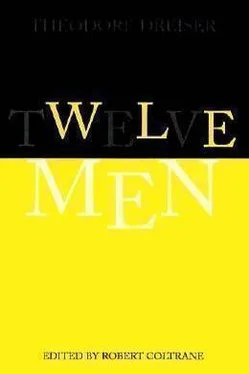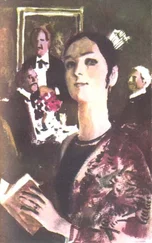Теодор Драйзер - Twelve Men
Здесь есть возможность читать онлайн «Теодор Драйзер - Twelve Men» весь текст электронной книги совершенно бесплатно (целиком полную версию без сокращений). В некоторых случаях можно слушать аудио, скачать через торрент в формате fb2 и присутствует краткое содержание. Год выпуска: 2014, Издательство: epubBooks Classics, Жанр: Биографии и Мемуары, на английском языке. Описание произведения, (предисловие) а так же отзывы посетителей доступны на портале библиотеки ЛибКат.
- Название:Twelve Men
- Автор:
- Издательство:epubBooks Classics
- Жанр:
- Год:2014
- ISBN:нет данных
- Рейтинг книги:4 / 5. Голосов: 1
-
Избранное:Добавить в избранное
- Отзывы:
-
Ваша оценка:
- 80
- 1
- 2
- 3
- 4
- 5
Twelve Men: краткое содержание, описание и аннотация
Предлагаем к чтению аннотацию, описание, краткое содержание или предисловие (зависит от того, что написал сам автор книги «Twelve Men»). Если вы не нашли необходимую информацию о книге — напишите в комментариях, мы постараемся отыскать её.
Twelve Men — читать онлайн бесплатно полную книгу (весь текст) целиком
Ниже представлен текст книги, разбитый по страницам. Система сохранения места последней прочитанной страницы, позволяет с удобством читать онлайн бесплатно книгу «Twelve Men», без необходимости каждый раз заново искать на чём Вы остановились. Поставьте закладку, и сможете в любой момент перейти на страницу, на которой закончили чтение.
Интервал:
Закладка:
"Here she is," he observed the day he married her, "me frau —Zuleika. Isn't she a peach? Ever see any nicer hair than that? And these here, now, pink cheeks? What? Look at 'em! And her little Dutchy nose! Isn't it cute? Oh, Dutchy! And right here in me vest pocket is the golden band wherewith I am to be chained to the floor, the domestic hearth. And right there on her finger is my badge of prospective serfdom." Then, in a loud aside to me, "In six months I'll be beating her. Come now, Zuleika. We have to go through with this. You have to swear to be my slave."
And so they were married.
And in the home afterward he was as busy and helpful and noisy as any man about the house could ever hope to be. He was always fussing about after hours "putting up" something or arranging his collections or helping Zuleika wash and dry the dishes, or showing her how to cook something if she didn't know how. He was running to the store or bringing home things from the downtown market. Months before the first child was born he was declaring most shamelessly, "In a few months now, Dreiser, Zuleika and I are going to have our first calf. The bones roll for a boy, but you never can tell. I'm offering up prayers and oblations—both of us are. I make Zuleika pray every night. And say, when it comes, no spoiling–the–kid stuff. No bawling or rocking it to sleep nights permitted. Here's one kid that's going to be raised right. I've worked out all the rules. No trashy baby–foods. Good old specially brewed Culmbacher for the mother, and the kid afterwards if it wants it. This is one family in which law and order are going to prevail—good old 'dichtig, wichtig' law and order."
I used to chuckle the while I verbally denounced him for his coarse, plebeian point of view and tastes.
In a little while the child came, and to his immense satisfaction it was a boy. I never saw a man "carry on" so, make over it, take such a whole–souled interest in all those little things which supposedly made for its health and well–being. For the first few weeks he still talked of not having it petted or spoiled, but at the same time he was surely and swiftly changing, and by the end of that time had become the most doting, almost ridiculously fond papa that I ever saw. Always the child must be in his lap at the most unseemly hours, when his wife would permit it. When he went anywhere, or they, although they kept a maid the child must be carried along by him on his shoulder. He liked nothing better than to sit and hold it close, rocking in a rocking–chair American style and singing, or come tramping into my home in New York, the child looking like a woolen ball. At night if it stirred or whimpered he was up and looking. And the baby–clothes!—and the cradle!—and the toys!—colored rubber balls and soldiers the first or second or third week!
"What about that stern discipline that was to be put in force here—no rocking, no getting up at night to coddle a weeping infant?"
"Yes, I know. That's all good stuff before you get one. I've got one of my own now, and I've got a new light on this. Say, Dreiser, take my advice. Go through the routine. Don't try to escape. Have a kid or two or three. There's a psychic punch to it you can't get any other way. It's nature's way. It's a great scheme. You and your girl and your kid."
As he talked he rocked, holding the baby boy to his breast. It was wonderful.
And Mrs. Peter—how happy she seemed. There was light in that house, flowers, laughter, good fellowship. As in his old rooms so in this new home he gathered a few of his old friends around him and some new ones, friends of this region. In the course of a year or two he was on the very best terms of friendship with his barber around the corner, his grocer, some man who had a saloon and bowling alley in the neighborhood, his tailor, and then just neighbors. The milkman, the coal man, the druggist and cigar man at the next corner—all could tell you where Peter lived. His little front "yard" had two beds of flowers all summer long, his lot in the back was a garden—lettuce, onions, peas, beans. Peter was always happiest when he could be home working, playing with the baby, pushing him about in a go–cart, working in his garden, or lying on the floor making something—an engraving or print or a box which he was carving, the infant in some simple gingham romper crawling about. He was always busy, but never too much so for a glance or a mock–threatening, "Now say, not so much industry there. You leave my things alone," to the child. Of a Sunday he sat out on the front porch smoking, reading the Sunday paper, congratulating himself on his happy married life, and most of the time holding the infant. Afternoons he would carry it somewhere, anywhere, in his arms to his friends, the Park, New York, to see me. At breakfast, dinner, supper the heir presumptive was in a high–chair beside him.
"Ah, now, here's a rubber spoon. Beat with that. It's less destructive and less painful physically."
"How about a nice prust" (crust) "dipped in bravery" (gravy) "—heh? Do you suppose that would cut any of your teeth?"
"Zuleika, this son of yours seems to think a spoonful of beer or two might not hurt him. What do you say?"
Occasionally, especially of a Saturday evening, he wanted to go bowling and yet he wanted his heir. The problem was solved by fitting the latter into a tight little sweater and cap and carrying him along on his shoulder, into the bar for a beer, thence to the bowling alley, where young hopeful was fastened into a chair on the side lines while Peter and myself or some of his friends bowled. At ten or ten–thirty or eleven, as the case might be, he was ready to leave, but before that hour les ongfong might be sound asleep, hanging against Peter's scarf, his interest in his toes or thumbs having given out.
"Peter, look at that," I observed once. "Don't you think we'd better take him home?"
"Home nothing! Let him sleep. He can sleep here as well as anywhere, and besides I like to look at him." And in the room would be a great crowd, cigars, beers, laughter, and Peter's various friends as used to the child's presence and as charmed by it as he was. He was just the man who could do such things. His manner and point of view carried conviction. He believed in doing all that he wanted to do simply and naturally, and more and more as he went along people not only respected, I think they adored him, especially the simple homely souls among whom he chose to move and have his being.
About this time there developed among those in his immediate neighborhood a desire to elect him to some political position, that of councilman, or State assemblyman, in the hope or thought that he would rise to something higher. But he would none of it—not then anyhow. Instead, about this time or a very little later, after the birth of his second child (a girl), he devoted himself to the composition of a brilliant piece of prose poetry ("Wolf"), which, coming from him, did not surprise me in the least. If he had designed or constructed a great building, painted a great picture, entered politics and been elected governor or senator, I would have taken it all as a matter of course. He could have. The material from which anything may rise was there. I asked him to let me offer it to the publishing house with which I was connected, and I recall with interest the comment of the oldest and most experienced of the bookmen and salesmen among us. "You'll never make much, if anything, on this book. It's too good, too poetic. But whether it pays or not, I vote yes. I'd rather lose money on something like this than make it on some of the trash we do make it on."
Amen. I agreed then, and I agree now.
The last phase of Peter was as interesting and dramatic as any of the others. His married life was going forward about as he had planned. His devotion to his home and children, his loving wife, his multiplex interests, his various friends, was always a curiosity to me, especially in view of his olden days. One day he was over in New York visiting one of his favorite Chinese importing companies, through which he had secured and was still securing occasional objects of art. He had come down to me in my office at the Butterick Building to see if I would not come over the following Saturday as usual and stay until Monday. He had secured something, was planning something. I should see. At the elevator he waved me a gay "so long—see you Saturday!"
Читать дальшеИнтервал:
Закладка:
Похожие книги на «Twelve Men»
Представляем Вашему вниманию похожие книги на «Twelve Men» списком для выбора. Мы отобрали схожую по названию и смыслу литературу в надежде предоставить читателям больше вариантов отыскать новые, интересные, ещё непрочитанные произведения.
Обсуждение, отзывы о книге «Twelve Men» и просто собственные мнения читателей. Оставьте ваши комментарии, напишите, что Вы думаете о произведении, его смысле или главных героях. Укажите что конкретно понравилось, а что нет, и почему Вы так считаете.









